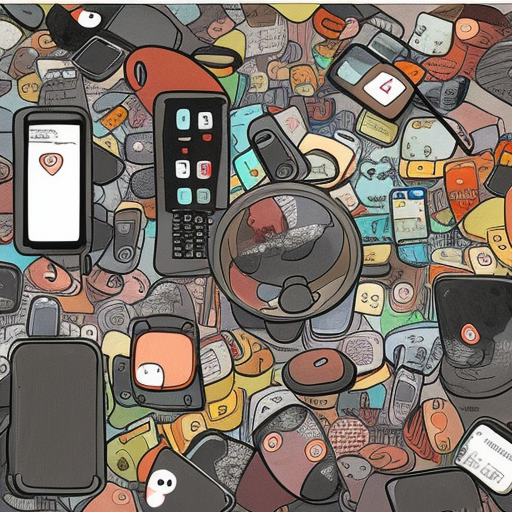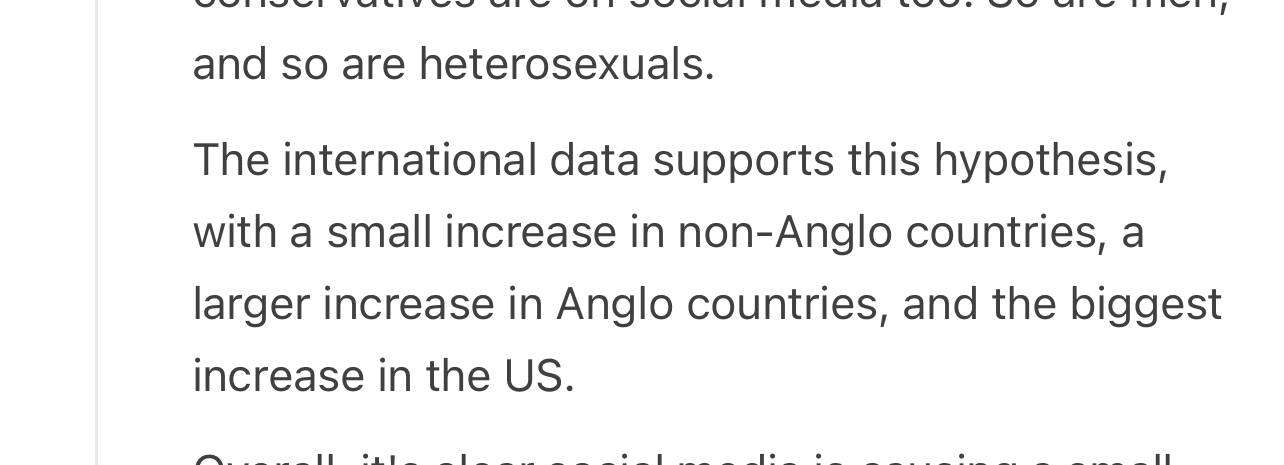
it = "worsening teenage / young adult mental health in the anglosphere since ~2010"
Background reading:
Some blog posts:
Noah Smith: Honestly, it's probably the phones
Zvi Mowshowitz: The Kids Are Not Okay
Richard Hanania: How I Changed My Mind on Social Media and Teen Depression
Haidt, J., & Twenge, J. (ongoing). Social media and mental health: A collaborative review (massive, open, non-systematic review of the scientific literature)
Jean Twenge: Have smartphones destroyed a generation? (old op-ed)
Orben & Przybylski (2019): The association between adolescent well-being and digital technology use (skeptical review paper)
Resolves to my subjective probability that smartphones / social media use explain >50% of the increase in mental health issues among US teenagers / young adults (measured in DALYs and/or WELLBYs) since the first iPhone came out.
This is an important question and hasn't gotten much attention, I added it to a market/discussion around subsidising such questions below.
But @JavierPrieto, the question's weakness is the subjective resolution criteria. If you were to make your thinking more concrete as to what sorts of evidence would be convincing one way or the other, it might help encourage traders (subsidised or not). It's a really important question and it would good to have the full power of prediction markets unleashed on it.
@IsaacKing Awesome. I'll see if I can think of a way to operationalise the question better, and anyone else should feel free to do so too (and I am not assuming you're making any promises).
@LudwigBald I haven't seen any new evidence or arguments one way or the other, though I haven't been actively looking.
From the perspective of a Certified Young Person (right on the line between Millennial and Gen Z):
Social media leads to social anxiety and FOMO, as well as unhealthy comparisons - people only post their best on social media, since it's ultimately a performance. So people compare their average to other people's best and naturally end up feeling inferior, even though they're not. I avoid all "real" social media for this reason, and prefer to remain mostly anonymous online aside from some professional stuff (LinkedIn and a personal portfolio website) because it makes the toxic effects of social media way less bad. I haven't touched a social media account connected to my real name in about six years.
Access to more information can make mental health worse - "ignorance is bliss" has a lot of truth behind it. For example, young people can see The Horrors unfolding in real time: live updates on wars, live updates on politics, etc. is just straight-up not good for you. My mental health is inversely correlated with my news intake and has been since roughly 2015.
Being young in the U.S. sucks right now. Very few of us can afford housing, we're drowning in student loan debt, politicians completely ignore us, we're watching the slow deterioration of American democracy, and many of us (25% of Gen Z are queer) are seeing our rights eroded across much of the country. We can also compare our situation to others, and America is bleak compared to a lot of other developed countries - where's our universal health coverage? Rights for workers? Protections for queer people? We, more than generations before, truly understand the gap between the U.S. and other countries, particularly those in Europe. Many of us went to college hoping it would set us on a stable career path - instead, almost all of us are burdened by debt and can't find any jobs besides increasingly miserable and soul-sucking retail and food service jobs. Many of us grew up during the Great Recession - and from my perspective, it feels like it never really ended, and economic stress for young people is just the new normal.
Similar to the above, there's a massive generational gap in ideology, and right now the old conservatives are winning politically. Most young people are leftists, and leftism is almost entirely disenfranchised in the U.S., except at the state level in a few very progressive states. There's a good reason we invented the phrase "OK Boomer" - we're exhausted of older generations pushing us under the surface as we're already struggling to tread water. We've also had our hopes for change and progress dashed multiple times - in particular, I'm very disillusioned seeing the far-right turn American politics took after Obama, seeing the way the Democratic establishment constantly screws over young progressives in favor of geriatric centrists...it's exhausting to be young and a leftist.
Being terminally online has a lot of downsides for mental health - "touch grass" is a phrase for a good reason. Being outside is good for you - vitamin D, endorphins from exercise, etc. - and sitting inside at a computer or looking at a phone isn't great. We need face-to-face interaction on a regular basis, and being terminally online can lead to a lot of anger and stress as you're exposed to a lot of stupid and bizarre takes (people will say shit online they'd never say in person.)
Gen Z is the most diverse generation in America's history, at least in terms of race, ethnicity, and queerness. Being a minority in America is really damn stressful, and a disproportionate number of people feeling that stress are young. When you constantly have to worry about having ICE called on you, or being used as target practice by the police, or being arrested for using the "wrong" bathroom, or being bullied to the point of attempting suicide because of your sexuality, you're most likely going to be a lot less mentally healthy than a retired, comfortably wealthy cishet man in his 50s/60s.
Older people, especially men, tend to be less open about their mental health, because there were stronger stigmas around talking about mental health and seeking therapy when they were young. For example, my biological father killed himself last October, and there was no indication it was coming, since he'd concealed his depression entirely until it was too late, and to my knowledge had never sought therapy.
Younger people lack those taboos around talking about mental health, so our struggles are much more open and visible. It's also easier for us to find support groups online, and easier for us to understand mental health issues since information about them is much, much easier for us to access. My parents always used to dismiss me as "too sensitive," "a worrywart," etc. - but thanks to a lot of therapy, I know that I have general anxiety disorder, ADHD, and God knows what else. It's worth noting that many of us grew up with bad parents - a lot of people I know have some combination of PTSD and C-PTSD (the latter of which wasn't even recognized until recently.) More of us are open about having ADHD, autism, etc. as well - so rates are "increasing" despite the prevalence of both probably not having changed much in the past few decades.
Climate change is going to affect us far more than it affects older generations. The vast majority of people born before 1970 will be dead before 2060, while the vast majority of people born between 1980 and 2010 will still be alive. We're watching older politicians shift the consequences of their inaction onto us in real time.
TL;DR there are a lot of reasons rates of mental illness - particularly anxiety and depression - are very high among young people. I think social media sure isn't helping, and neither is the constant stream of information we're being bombarded with every day...but I bet even without any phones or social media, rates of anxiety and depression among young people would still be disproportionately high, and the situation is so complex that trying to untangle the effects of just social media and phone usage - as opposed to things like the type of content consumed, the types of things we see in the news, etc. - is probably impossible.
I'm not betting on this market since it's subjective and I expect a YES resolution regardless of anything I've said here, but I needed to at least share my own experiences, if only to inform other bettors.
@Gigacasting That image is poorly-cropped - not sure if I'm supposed to read the top line, and if so, how. I don't know if it's just an issue with Manifold or if you originally made it like that. Your other screenshot below has a similar issue.
@Gigacasting Remember that this market is about what is making children upset, not what ought to be making children upset.

